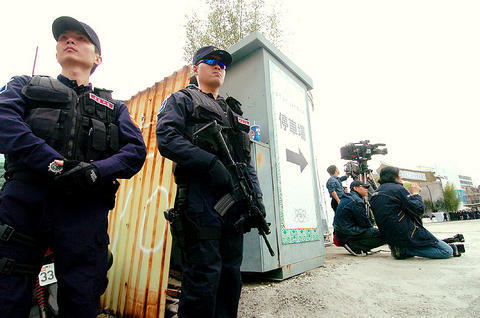More than 1,000 police officers were yesterday stationed at the temporary funeral hall for former Bamboo Union gang leader Chen Chi-li (
Chen, who turned the Bamboo Union into one of Taiwan's largest gangs, died of pancreatic cancer in Hong Kong on Oct. 4. He was 64. His body was delivered back to Taiwan from Hong Kong yesterday and arrived at the temporary funeral services site around 2pm.
In addition to the police officers, at least another 500 people, including Bamboo Union members, Chen's friends and family members gathered at the shrine to greet Chen's casket.

PHOTO: CHIEN JUNG-FONG, TAIPEI TIMES
Local television broadcast live coverage of the plane carrying Chen's body, with his family, friends and some 100 reported gang members landing at around noon.
"We want to make sure that gang members do not take advantage of the opportunity to promote gang activity or recruit new members," said Kao Cheng-sheng (高政昇), deputy commissioner for the Criminal Investigation Bureau.
Wu Dun (吳敦), a former Bamboo Union member and a good friend of Chen's, said that the final date for Chen's funeral service has yet to be decided, but should be sometime early next month.
The Bamboo Union was established in 1957.
For decades the gang remained Taiwan's most powerful gang, comprising mainly people who fled China's civil war in 1949. It later backed the Chinese Nationalist Party (KMT) government in their suppression of political dissidents.
Chen, wanted in Taiwan for organized crime, had been living in self-imposed exile in Cambodia since 1996. In August he was hospitalized in Hong Kong after his health declined.
The gang boss is best known for his involvement in the October 1984 shooting death of an author of an unflattering biography of president Chiang Ching-kuo.
Chen and several fellow gang members flew to San Francisco and gunned down Taiwanese-American writer Henry Liu (劉宜良), better known by his pen-name Jiang Nan (江南), at his home in the suburb of Daly City.
Liu's widow, Tsui Ron-chi (
"Chen Chi-li was sacrificed for our patriotic struggle," she said. "The murder gave Taiwanese dissidents an unprecedented chance" to win over support for their democratic campaign," she said.
Chen was nabbed in Taiwan one month later during a crackdown on organized crime.
At the trial, he said that the murder was ordered by a Taiwanese intelligence unit chief who claimed Liu spied for Taiwan, China and the US.
Chen and an accomplice in the killing were both sentenced to life in prison after Taiwan rejected a US demand to extradite the two for trial there.
Chen served six years in a Taiwanese jail before being paroled. Three senior intelligence officials were also jailed.
He later fled to Cambodia during another government crackdown on organized crime.
Chen is survived by his wife Chen Yi-fan (

The Ministry of Education (MOE) is to launch a new program to encourage international students to stay in Taiwan and explore job opportunities here after graduation, Deputy Minister of Education Yeh Ping-cheng (葉丙成) said on Friday. The government would provide full scholarships for international students to further their studies for two years in Taiwan, so those who want to pursue a master’s degree can consider applying for the program, he said. The fields included are science, technology, engineering, mathematics, semiconductors and finance, Yeh added. The program, called “Intense 2+2,” would also assist international students who completed the two years of further studies in

Former president Tsai Ing-wen (蔡英文) departed for Europe on Friday night, with planned stops in Lithuania and Denmark. Tsai arrived at Taiwan Taoyuan International Airport on Friday night, but did not speak to reporters before departing. Tsai wrote on social media later that the purpose of the trip was to reaffirm the commitment of Taiwanese to working with democratic allies to promote regional security and stability, upholding freedom and democracy, and defending their homeland. She also expressed hope that through joint efforts, Taiwan and Europe would continue to be partners building up economic resilience on the global stage. The former president was to first

Former president Tsai Ing-wen (蔡英文) on Monday called for greater cooperation between Taiwan, Lithuania and the EU to counter threats to information security, including attacks on undersea cables and other critical infrastructure. In a speech at Vilnius University in the Lithuanian capital, Tsai highlighted recent incidents in which vital undersea cables — essential for cross-border data transmission — were severed in the Taiwan Strait and the Baltic Sea over the past year. Taiwanese authorities suspect Chinese sabotage in the incidents near Taiwan’s waters, while EU leaders have said Russia is the likely culprit behind similar breaches in the Baltic. “Taiwan and our European

The Taipei District Court sentenced babysitters Liu Tsai-hsuan (劉彩萱) and Liu Jou-lin (劉若琳) to life and 18 years in prison respectively today for causing the death of a one-year-old boy in December 2023. The Taipei District Prosecutors’ Office said that Liu Tsai-hsuan was entrusted with the care of a one-year-old boy, nicknamed Kai Kai (剴剴), in August 2023 by the Child Welfare League Foundation. From Sept. 1 to Dec. 23 that year, she and her sister Liu Jou-lin allegedly committed acts of abuse against the boy, who was rushed to the hospital with severe injuries on Dec. 24, 2023, but did not